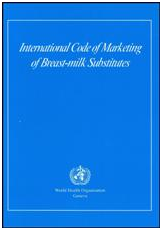International Code of Marketing of Breast-Milk Substitutes

Overview
The World Health Organization and UNICEF have for many years emphasized the importance of maintaining the practice of breastfeeding, and of reviving the practice where it is in decline, as a way to improve the health and nutrition of infants and young children. A variety of factors influence the prevalence and duration of breastfeeding.
The 27th World Health Assembly in 1974 noted the general decline in breastfeeding related to different factors including the production of manufactured breast-milk substitutes and urged Member countries to review sales promotion activities on baby foods and to introduce appropriate remedial measures, including advertisement codes and legislation where necessary.
The 33rd World Health Assembly, en May 1980, endorsed in their entirety the statement and recommendations agreed by consensus at this joint WHO/UNICEF meeting and made particular mention of the recommendation that "There should be an international code of marketing of infant formula and other products used as breast-milk substitutes".
In May 1981 the Health Assembly debated the issue after it had been introduced by the representative of the Executive Board. It adopted the code, as proposed, on 21 May by 118 votes.
Source: WHO International Code of Marketing of Breast-Milk Substitutes ¡V
https://www.who.int/nutrition/publications/infantfeeding/9241541601/en/
References:
Full Document: https://www.who.int/nutrition/publications/code_english.pdf
The International Code of Marketing of Breast-Milk Substitutes - 2017 Update (Frequently asked questions):
https://apps.who.int/iris/bitstream/handle/10665/254911/WHO-NMH-NHD-17.1-eng.pdf?sequence=1
The "International Code of Marketing of Breastmilk Substitute" was developed by the WHO and UNICEF in 1981 in order to protect breastfeeding. The aim of this Code is to contribute to the provision of safe and adequate nutrition for infants, by the protection and promotion of breastfeeding, and by ensuring the proper use of breastmilk substitutes, when these are necessary, on the basis of adequate information and through appropriate marketing and distribution. Some of the basic rules set out by the Code to regulate harmful marketing practices are:
- No advertising of breastmilk substitutes, feeding bottles and teats
- No free samples to mothers;
- No promotion of products in or through healthcare facilities;
- No company personnel to contact mothers;
- No gifts or personal samples to health workers. Health workers should never pass samples on to mothers;
- Labels should be in an appropriate language and have no words or pictures idealizing artificial feeding e.g. pictures of infants on the labels;
- All information on artificial infant feeding should clearly explain the benefits of breastfeeding, warn of the costs and hazards associated with artificial feeding;
- Manufacturers and distributors should comply with the Code (and all subsequent WHA resolutions) even if governments have not acted to implement it.
Source: Baby Friendly Hospital Initiative Hong Kong Association
¡@